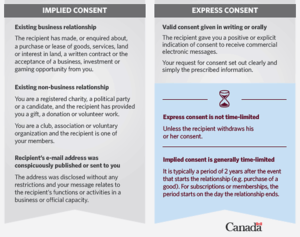Got $1-10 million dollars to lose? No? Then it’s time to get onboard with the new Canadian Anti-Spam Law.
The Canadian Anti-Spam Law went into effect on July 1st of this year, and while we’ve all got three years before the multi-million dollar penalties start showing up, it’s definitely time to get CASL compliant.
Before we get too far into the details of international law, please note that we are not lawyers. You should seek a competent attorney to decide exactly what is or is not right for your business.
While we aren’t lawyers, we are in the email industry, and so we’ve done a lot of research on what CASL says and what it might mean going forward. The good news is that it’s always better to respect subscribers’ preferences and to preserve the quality of your list. CASL will definitely make us do that. The bad news is some tried and true email marketing techniques are about to be history.
8 essential things to understand about the Canadian Anti-Spam Law
1) There is a 3-year transitional period that started on July 1st. After that, any Canadian can sue any person or company they believe has sent them a message in violation of CASL.
2) CASL fines are the most expensive in the world. Corporations who violate CASL can be fined up to $10 million dollars PER MESSAGE. Individuals who violate CASL can be fined up to $1 million dollars PER MESSAGE.
3) Not all businesses have to follow CASL, but if you can answer yes to any of the questions below then you do.
4) CASL does not apply to communications from
• non-profits
• political organizations
• family members
• employees
• consultants
• people associated with your business (like vendors)
• people you have an “established personal relationship” with
• business or personal referrals
• people who have contacted your business within the last 6 months
5) CASL applies only to commercial digital communications, aka “Commercial Electronic Messages” (CEM), like:
• emails
• text messages
• some social media communications
• any other message sent to an email address, phone number or a social media account
To be defined as commercial, the message must promote commercial activity or encourage the recipient to participate in promoting something commercial (like a Facebook contest, or writing a product review).
6) Some types of digital communication are exempt, including:
• anything related to a purchase – shipping updates, receipts or return information
• warranty or recall messages
• any communication for legal purposes (court orders, class-action suit messages)
7) CASL is hinged on the concept of consent, namely “express consent” and “implied consent”. Express consent is when someone voluntarily opts into a compliant opt-in form. Opt-in forms with pre-checked boxes are NOT compliant.
Once you’ve got express consent, you never have to ask for it again (unless the subscriber opts out).
The second type of consent is implied. You have the implied consent of an individual if they’ve done business with you in the last 24 months.
Just so you’re 100% clear on implied versus express consent, here’s part of an infographic from the CASL site.

8) You need a record of consent.
Anyone using double opt-in (aka confirmed opt-in) will already have a record of consent. But if you’re buying or renting lists, you’ll want to see the records of consent before you mail. You need to know when people signed up, how they signed up, and preferably which IP address they signed up from.
6 major implications of CASL
1) Co-registration companies and co-reg forms will see fewer opt-ins, now that they can’t use pre-checked forms.
This is not a huge loss (unless you’re a co-registration company). Using pre-checked forms has always resulted in poor-quality lists, so while the CASL compliant lists will be much smaller, they’ll be of better quality. This might end up being a good thing in the end.
2) Buying a list will become even less of a good idea.
With multi-million dollar penalties in play, you’d better trust your list broker. Or better yet, just let this bad email marketing practice go entirely (we have – purchased lists can’t be used with SMTP2GO). Besides, it’s not that hard to build a list.
3) Remarketing and shopping cart abandonment emails will have to stop – unless the recipient has opted into the company’s list with a valid opt-in form.
Again, if they haven’t signed up specifically for your list, don’t send them email. Having them be signed up for someone else’s email list (in this case, the remarketing company’s list) is not good enough.
4) Send to a friend emails will have to go away.
Send to a friend emails, (also called referral emails), are when someone likes an article, product, or anything else enough to tell someone about it via email. So they click the “email to a friend” link on that page, fill out their email and their “friend’s” email, maybe include a message and then send their friend a link to that page.
The problem is, the friend never said they wanted to get emails from that company. So that email, though well-intentioned, is unsolicited.
5) Single, or unconfirmed opt-in is riskier.
Now that we have to be able to prove when and how someone signed up for a list, not having people confirm their email addresses creates a problem. What if the single opt-in people on your list didn’t actually signup? What if someone else used their email address to “get them”… the same way some people used to ponder signing their enemies up for magazines with all those mail-in postcards?
6) Companies can no longer send gifts to customers who have complained online.
Here’s the scenario: A customer has a rotten experience with a company. They complain about it via Twitter. In the past, the company might send them a coupon or offer some other freebie to try to make up for the bad experience. But according to CASL, that’s not OK – a customer’s complaining about a company online does not constitute opting into their list. The company’s tweet is also promotional, in that it urges the complaining customers into buying again, and so the tweet, though well intentioned, is not OK.
Companies can reply to complaining customers, but only to ask them to contact customer service. If the customer chooses to follow through and contact customer service, then it is okay for the company to offer the coupon.
Those are the must-know facts and possible effects of CASL.





